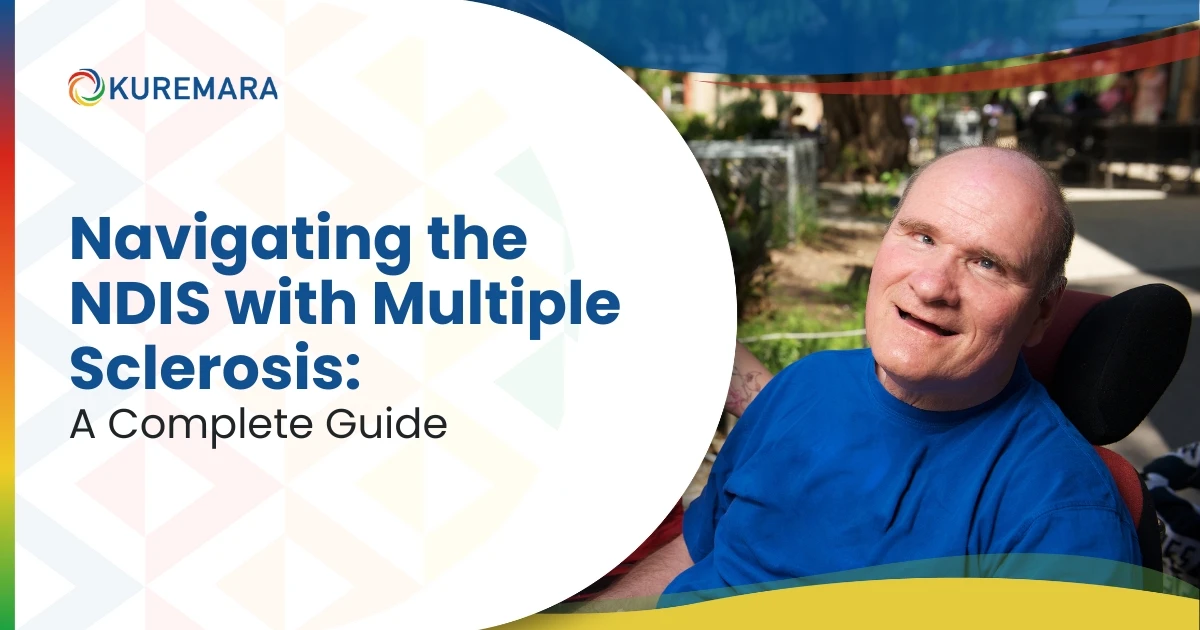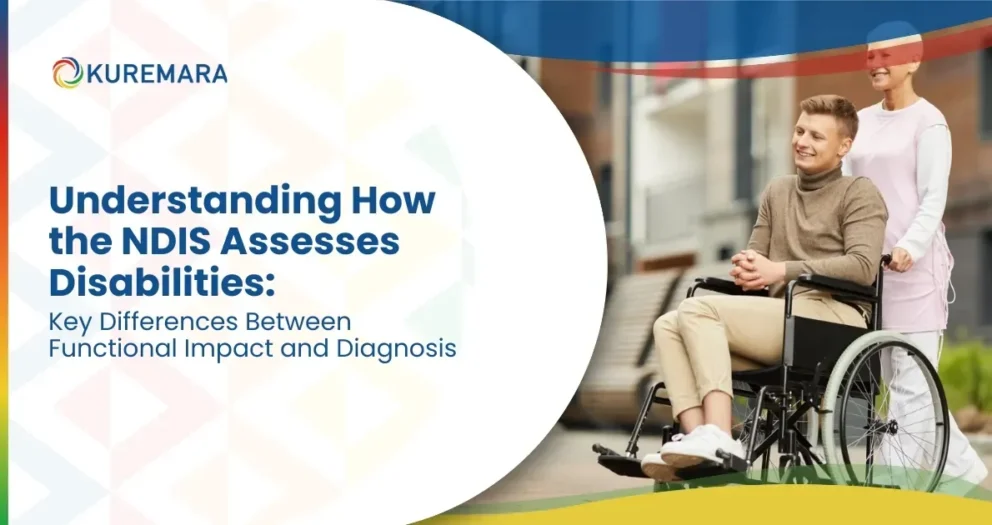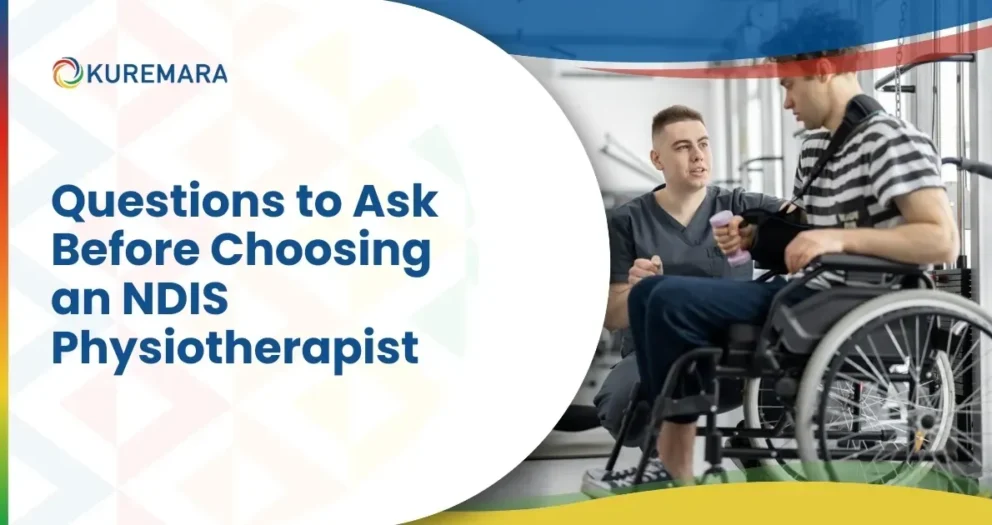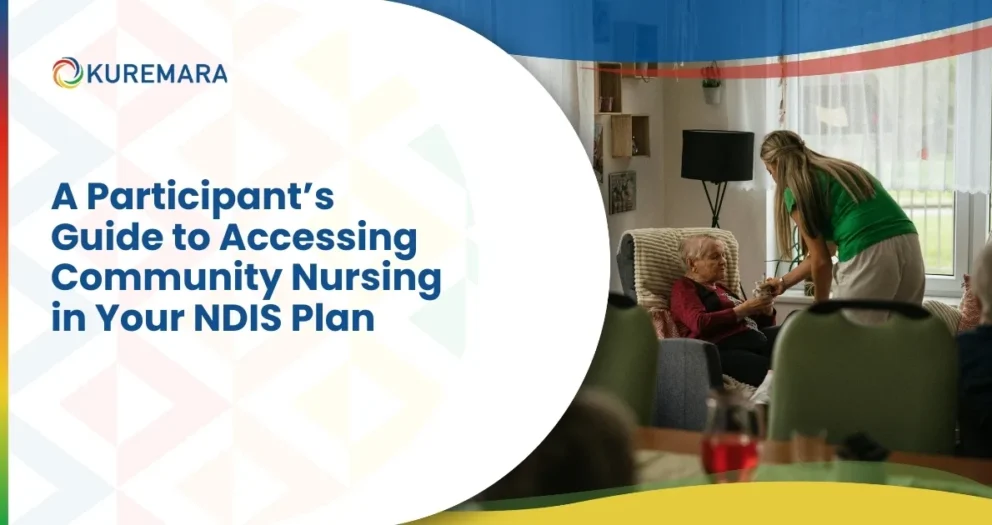Navigating the NDIS with Multiple Sclerosis: A Complete Guide
Picture waking up one morning and struggling to see clearly, feeling an overwhelming fatigue that won’t go away, or experiencing a tingling sensation in your hands and feet. These aren’t just isolated symptoms; they’re the daily reality for over 33,000 Australians living with Multiple Sclerosis (MS).
MS is a lifelong condition that affects people in unique ways. While some may experience mild changes over time, others face more visible challenges with mobility, vision, or memory. The unpredictability of MS can make everyday life more complex, but you are not alone.
This is where the National Disability Insurance Scheme (NDIS) makes a difference. Created to empower Australians with disability to live more independently, the NDIS provides tailored support to help people with MS manage their condition and achieve their personal goals.
In this guide, you’ll find:
- A simple explanation of what MS is and how it can impact everyday life
- A step-by-step overview of how the NDIS can support you or your loved one
- Advice on applying, planning, and accessing the right supports
- Insight into how Kuremara helps people living with MS navigate the NDIS with confidence
Let’s take this step together.
Understanding Multiple Sclerosis: What It Means for You
1. What is Multiple Sclerosis?
Multiple Sclerosis (MS) is a chronic autoimmune condition. It occurs when the body’s immune system mistakenly attacks the central nervous system, specifically the brain and spinal cord. This causes inflammation and damage to the protective covering around nerves, disrupting signals between the brain and the rest of the body.
MS affects each person differently, making it a deeply personal experience.
2. Multiple Sclerosis Symptoms & Early Signs
No two people experience MS the same way. However, some commonly reported symptoms include:
-
-
- Ongoing fatigue
-
-
-
- Tingling or numbness, especially in the arms or legs
-
-
-
- Difficulty with balance or walking
-
-
-
- Blurred or double vision
-
-
-
- Cognitive changes such as memory difficulties or slower thinking
-
These symptoms may come and go or gradually worsen over time. That’s why early attention, diagnosis, and ongoing support are essential.
3. What Causes Multiple Sclerosis?
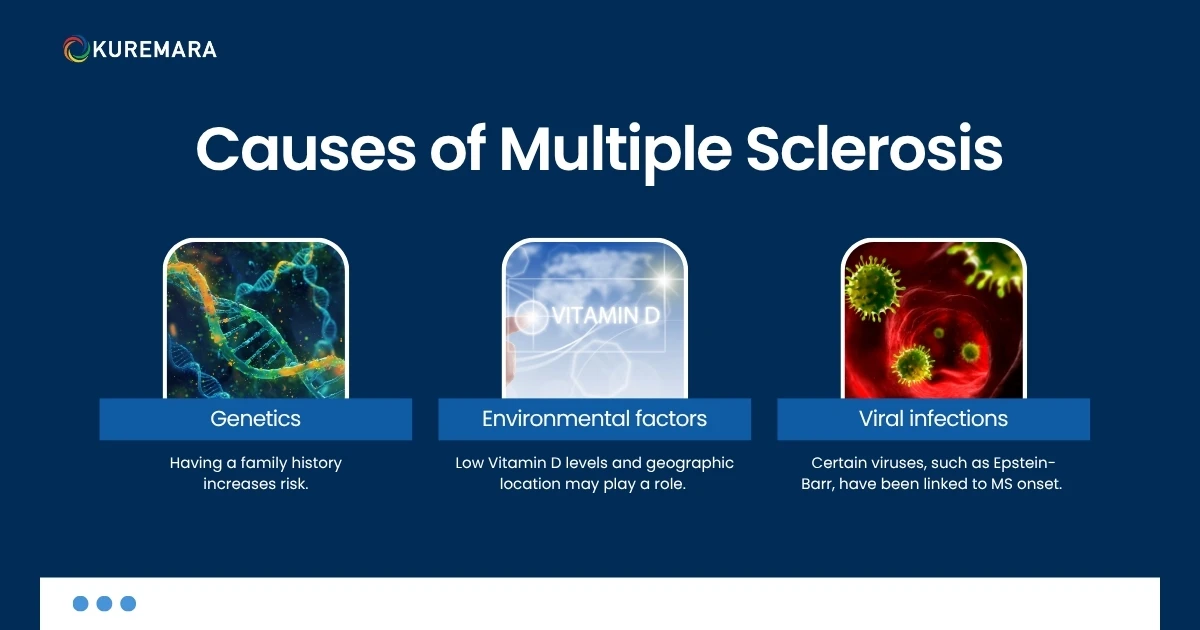
While the exact cause remains unclear, research highlights several contributing factors:
- Genetics: Having a family history increases risk.
- Environmental factors: Low Vitamin D levels and geographic location may play a role.
- Viral infections: Certain viruses, such as Epstein-Barr, have been linked to MS onset.
Understanding the Different Types of Multiple Sclerosis
MS is not a one-size-fits-all condition. It can show up in different ways, and how it progresses over time varies from person to person. That’s why understanding the different types of MS is important it helps individuals, families, and support teams plan the right kind of care.
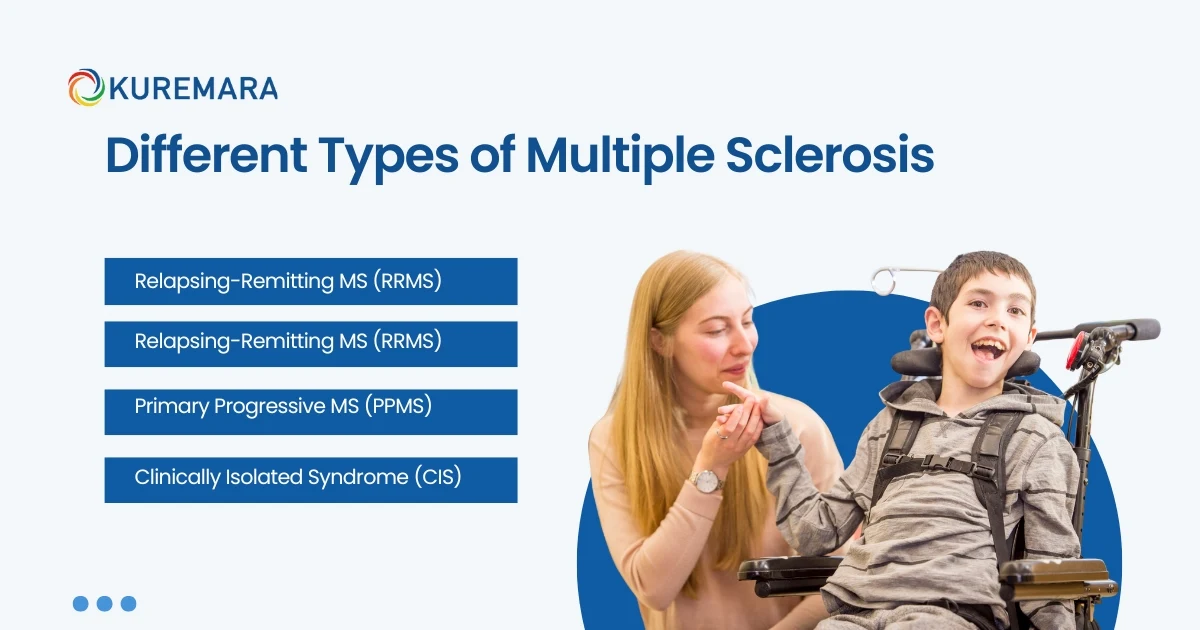
Here are the four main types of MS:
A. Relapsing-Remitting MS (RRMS) – This is the most common form of MS, especially in the early years of diagnosis. People with RRMS experience clearly defined episodes of new or worsening symptoms, known as relapses. These are often followed by periods of remission, where symptoms partially or fully improve. Some people go months or even years between relapses, while others may notice more frequent changes.
B. Secondary Progressive MS (SPMS) – Over time, many individuals with RRMS may transition into SPMS. In this stage, the condition gradually becomes more consistent in its progression. While relapses may still occur, the primary feature becomes a steady increase in challenges related to movement, fatigue, or other symptoms. However, the experience still differs widely from person to person, and many continue to lead active, fulfilling lives with the right supports.
C. Primary Progressive MS (PPMS) – PPMS involves a slow and steady progression of symptoms from the start, without clear relapses or remissions. It may take longer to reach a diagnosis, and the effects can often feel more subtle but continuous. People with PPMS may experience changes in walking, balance, or muscle strength early on. Support, assistive technologies, and therapies play an important role in managing day-to-day activities.
D. Clinically Isolated Syndrome (CIS) – CIS refers to a single episode of neurological symptoms, often lasting at least 24 hours, that may suggest MS but hasn’t yet met all the criteria for a diagnosis. Some people with CIS may never experience another episode, while others may go on to develop RRMS. Either way, it’s a critical window for early monitoring and care, as timely treatment can make a significant difference.
Multiple Sclerosis Treatments & Management
Although MS can be a lifelong condition, it doesn’t have to define your life. Today, there are more treatment options, support services, and community resources than ever before designed to help you manage symptoms and maintain your wellbeing.
Here’s what holistic MS care might include:
* Disease-Modifying Therapies (DMTs)
These treatments work by reducing inflammation and slowing the progression of the disease. They can help reduce the number and severity of relapses in people with RRMS and may delay disability progression in other types of MS. Your neurologist will help determine which therapy is best suited for you.
* Symptom Management
Managing fatigue, pain, mobility challenges, or vision issues may involve a combination of:
-
-
- Medication
-
-
-
- Energy conservation strategies
-
-
-
- Nutritional adjustments
-
-
-
- Lifestyle changes like gentle exercise, mindfulness, and good sleep habits
-
Everyone’s management plan looks different, and that’s okay.
* Rehabilitation and Emotional Wellbeing
Supportive therapies such as physiotherapy, occupational therapy, speech therapy, and counselling are key to maintaining independence and improving your quality of life. Emotional health matters too seeking help from a psychologist, support group, or peer network can make a big difference in how you feel and cope day to day.
* Personalised Support Services
Whether it’s help at home, transport to appointments, or connecting with others in the community, the right mix of supports can help you stay engaged, confident, and in control of your own journey.
Accessing NDIS Support with MS: A Step-by-Step Guide
A.What Is the NDIS?
The National Disability Insurance Scheme (NDIS) is a government initiative that funds individualised supports for people with permanent and significant disabilities. It exists to promote independence, build skills, and enhance social participation for participants across Australia.
B. Who Is Eligible?
To be eligible for the NDIS, you must:
-
-
- Be under 65 years of age when applying
-
-
-
- Be an Australian citizen, permanent resident, or Protected Special Category Visa holder
-
-
-
- Live with a permanent and significant disability
-
Many people with MS meet this definition, as the condition can impact mobility, energy levels, cognitive functioning, and independence.
C. The NDIS Application Process
Here’s a simplified breakdown:
* Collect Supporting Evidence
Ask your neurologist, GP, or allied health team to prepare reports that describe your diagnosis, how it affects your life, and your need for ongoing support.
* Submit an Access Request Form
This can be completed over the phone or by filling out a paper form with the NDIS.
* Undergo the Assessment
The NDIS team may ask for additional assessments or details. This is your opportunity to clearly explain how MS affects your everyday life, not just on your best days, but on your hardest ones too.
D. Creating Your NDIS Plan
Once your application is approved, you’ll attend a planning meeting to develop your first NDIS plan. Come prepared with:
-
-
- Personal goals (both short-term and long-term)
-
-
-
- A list of challenges you face daily
-
-
-
- The type of support that would help you live more independently
-
Your plan will include funding for reasonable and necessary support, meaning the services and items needed to help you achieve your goals and participate in everyday life.
E. Common NDIS Supports for MS
Depending on your circumstances, you may receive support for:
-
-
- Therapies – including physiotherapy, occupational therapy, and psychology
-
-
-
- Assistive technology – such as wheelchairs, communication tools, or home sensors
-
-
-
- Home modifications – like accessible bathrooms or ramps
-
-
-
- Daily personal care – assistance with grooming, dressing, and meal preparation
-
-
-
- Support coordination – a professional who helps you implement and manage your plan
-
-
-
- Community access – support to help you participate in social activities, groups, or hobbies
-
F. Managing Your NDIS Funds
You can choose how your NDIS funding is managed:
-
-
- Self-managed – you control the budget and pay providers directly
-
-
-
- Plan-managed – a registered provider takes care of the financial side while you choose your services
-
-
-
- NDIA-managed – the NDIS pays registered providers on your behalf
-
Choose the option that makes you feel most comfortable and in control.
Kuremara’s Commitment: Personalised Support for Your MS Journey
At Kuremara, we recognise the individuality of every person’s experience with MS. We are a registered NDIS provider dedicated to empowering people with disability, including those living with Multiple Sclerosis.
Here’s how we support you through every step of your NDIS journey:
What We Offer
-
- Guidance Through the NDIS Process
From the first form to your final plan, we’re here to help you understand and access what’s available.
- Guidance Through the NDIS Process
-
- Plan Development & Review
Our team works closely with you to ensure your NDIS plan reflects your actual support needs and personal aspirations.
- Plan Development & Review
-
- Tailored Services
Including in-home care, personal assistance, community participation, therapy support, and more.
- Tailored Services
-
- Inclusive and Respectful Approach
We listen, we involve you in every decision, and we respect your right to choice and control.
- Inclusive and Respectful Approach
-
- Empowering Independence
Our mission is to help you live the life you choose, not just manage your condition.
- Empowering Independence
With Kuremara, you are not just receiving a service; you’re gaining a team that genuinely cares about your wellbeing and independence.
Practical Tips to Navigate MS and the NDIS with Confidence
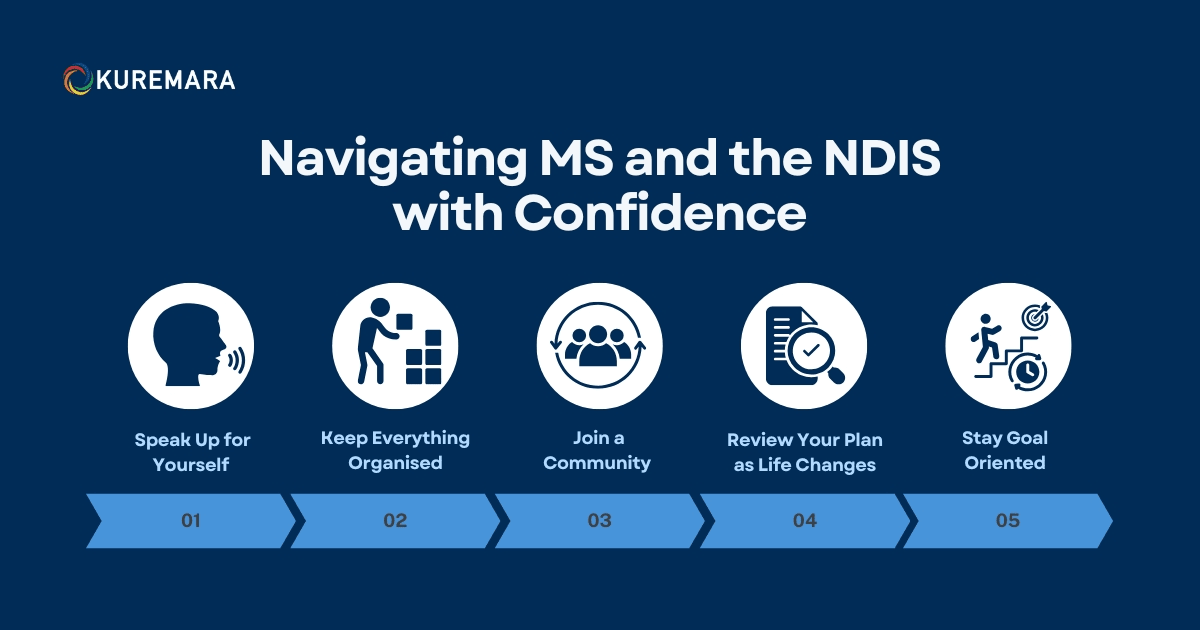
1. Speak Up for Yourself
You know your body and your needs better than anyone. Whether it’s during assessments or service delivery, advocate for your right to appropriate, respectful support.
2. Keep Everything Organised
Store all important documents in one place this includes medical records, NDIS communications, receipts, and reports. This can make reviews or changes much easier.
3. Join a Community
Connecting with MS support groups or NDIS peer networks can help you feel seen, heard, and supported. You’ll gain insights, encouragement, and perhaps even new friendships.
4. Review Your Plan as Life Changes
MS can change over time. Don’t hesitate to request a plan review if your condition, goals, or circumstances shift. The NDIS is designed to evolve with you.
5. Stay Goal-Oriented
Keep your goals at the centre of your plan, whether it’s learning a new skill, maintaining independence at home, or connecting with others socially. Your NDIS supports should serve your dreams, not define them.
A Final Word: You Deserve to Thrive
Living with MS is a journey filled with uncertainty but it’s also filled with potential, growth, and hope.
The NDIS is more than just a funding scheme; it’s a lifeline that enables Australians with MS to live fulfilling, empowered lives.
At Kuremara, we believe everyone deserves to thrive not just survive. If you or someone you know is navigating life with Multiple Sclerosis and seeking NDIS support, we’re here to guide you every step of the way.
 care@kuremara.com.au
care@kuremara.com.au
